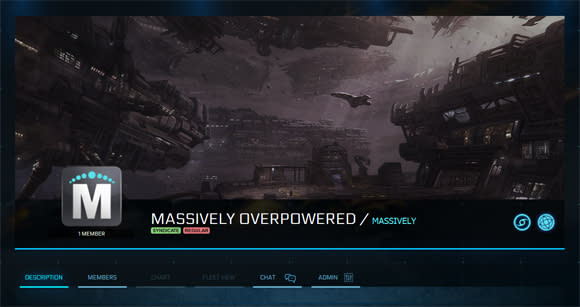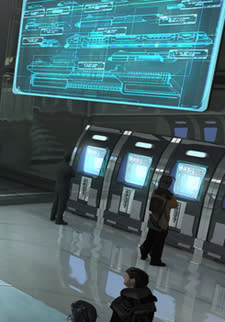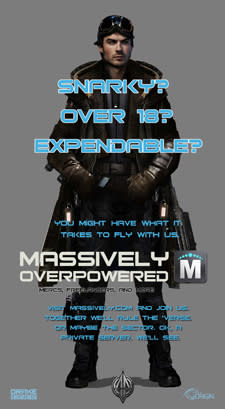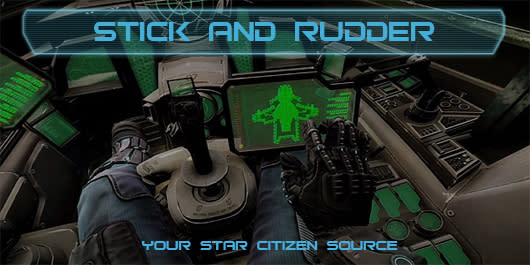Stick and Rudder: It's the Massively Star Citizen guild
I love me some guild management tools, which is strange since I don't manage guilds all that often. It's a bit of work, see, as one look through the titles and topics in our Guild Counsel category will make clear.
At any rate, I can't stop playing around with Star Citizen's recently launched Organization stuff.

Why's that, you ask? I don't rightly know. Call it a brain defect or a personality quirk. It's probably the same reason why I find watching baseball incredibly boring and yet love to peruse box scores, stat lines, Sabermetrics, and the like.
Getting organized and managing data is fun, and it's all the more fun when you throw spaceships and the teasing promise of SC's sandbox gameplay into the mix. With the title's Organization tools, a large part of the appeal is of course that it's the newest bit of game-like content available to backers. Our first real taste was last fall's hangar module, and I still pop in there once or twice a week to tool around with my loadouts, pretend to feed my fish, and snap screenshots of my ships from dozens of different angles.

The Org tools are a bit more tangible. Even though they're currently in a web client instead of a game client, you can see various pre-alpha communities and ideas coming together, and it's exciting to realize that all of this will translate directly into the finished persistent universe. Provided, of course, that all these enthusiastic early adopters can be patient for another couple of years!
If you're not a backer but are curious about the Org functionality, let me break it down for you. Cloud Imperium proper is busy crunching on the dogfighting module and a bunch of other stuff, so it outsourced round one of the game's guild functionality to Montreal's Turbulent. And Turbulent has delivered a nifty-looking sub-section of the main Roberts Space Industries website that fits right in with all of the immersive internet spaceship trappings while providing a good bit of functionality out of the box.
There's guild and officer live chat, as well as access to the always-buzzing Star Citizen general chat channel (seriously, the number of people yakking it up in here around the clock never ceases to amaze me). There are also plenty of branding tools that let you customize the look, feel, and verbiage of your Org's portal. The defaults feature some of that spiffy Star Citizen concept art as well as fonts and various emblems that match the rest of the RSI main site, but you're free to upload your own banner graphics, logos, icons, and so on.
Plus, CIG has given backers ample space to spell out their organizational visions using the written word. Each Org site features a History, Manifesto, and Charter tab that allows for text formatting, hyperlinks, and basic HTML functions.

Membership may be sorted and viewed via ranks and roles, both of which may customized. You can also specify your Org's primary language, its playstyle (including casual, regular, hardcore, and roleplay flags), and first- and second-level choices for your primary guild activities. For example, I've set up Massively Overpowered as a freelancing and smuggling outfit, which anyone can easily confirm by mousing over the two icons at the bottom right of the main banner. This can also be changed to anything from bounty hunting to piracy to engineering to trading with a button press.
Why would you want to do all this? Because it's searchable, so it's quite easy for prospective guild members to narrow down their choices instead of simply applying to the corp with the coolest name. It's also tied in with your RSI forum identity, so you can keep tabs on your frenemies or recruit from the heavily trafficked Star Citizen forums as you like.
Org leaders can change the name of the Org, though not its Spectrum ID. For example, if Massively Overpowered morphed into a pure PvP guild at some point, I could rename it Massively Gank Squad or whatever, whereas the Spectrum ID tag MASSIVELY would remain as the in-game identifier. In other words, be sure about your Spectrum ID if you're creating an Org because your first choice is both unique and permanent.
You can also change your Org archetype if you're so inclined. Available archetypes include organization, corporation, private military company, faith-based organization, and syndicate. As of press time, these are exclusively flavor- or roleplay-centric designators, though they do offer different visual starter templates.
Finally, Star Citizen's 1.0 Org system features a bit of recruitment functionality that allows for invites and application processing. While it's nothing you haven't seen before at Guild Launch and the like, it's a nice bonus for community builders, especially for a pre-alpha game. In terms of future functionality, you can see some of what's planned via the ghosted out sections of the site named Chart and Fleet View. CIG has also mentioned full-featured forums for each individual Org, shoutboxes, news update capability, and more.
It's also worth pointing out that the Organization release is another notch on CIG's development axe. Counting the hangar module and the dogfighting module, this makes two out of three pieces of promised functionality delivered on time and working-as-intended.
So that's about it for this week's hands-on with the new Organization tools. As I mentioned above, there is a Massively guild and you're welcome to join it. Here's a direct link, or you can search for it at the Organization landing page on the RSI website. Also keep in mind that CIG requires you to be a SC backer to join any Org. As of now, there are no concrete plans for the guild other than fun and fellowship. That may change depending on member desires, but for the moment feel free to think of MVOP as another place to hang out and talk Star Citizen!


Whether it's interviews with Chris Roberts and the Cloud Imperium team or tips and guides for pushing your ship's performance envelope, Stick and Rudder is your inside source for news and commentary on the world of Star Citizen. Join Jef Reahard every other week during the run-up to alpha, beta, and beyond.



